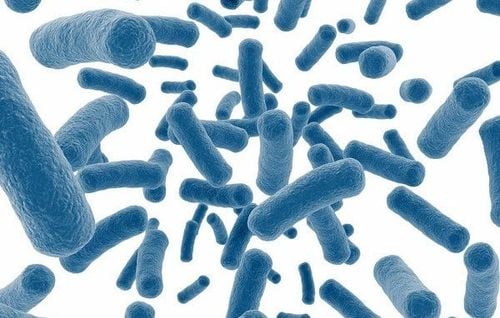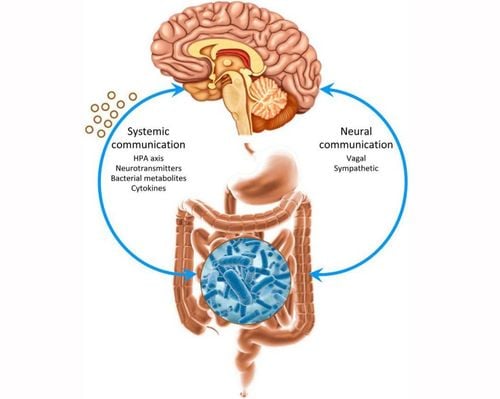This is an automatically translated article.
A neurotransmitter is a chemical messenger that enhances and balances signals between nerve cells and target cells in the body. These target cells may be located in glands, muscles, or other nerve cells.
1. How neurotransmitters help your body communicate and connect
Neurotransmitters are the language of the brain. They make connections and allow neurons to communicate with other brain cells. However, not only that, muscles also receive signals from neurotransmitters. In fact, these chemical messengers send information throughout the body.
Different types of neurotransmitters work differently. Some manage heart rate and blood pressure, others make you feel motivated, stabilize your mood, or help you fall asleep.
Billions of neurotransmitter molecules work continuously to keep our brains active, managing everything from our breathing and heart rate to our concentration and learning levels. They can also affect a variety of psychological functions such as fear, joy or excitement.
In order for nerve cells to send messages throughout the body, they need to be able to communicate with each other to transmit signals. Communication is the key to the health of the body. However, it is not simply neurons that connect to each other. There is a small gap called a synapse at the end of each neuron, and in order to communicate with the next cell, the signal needs to be able to cross this small space. This process occurs through an activity known as neurotransmission.
In most cases, a neurotransmitter is released from the so-called axon terminal after the activity reaches the synapse, this is where neurons can transmit signals for each other.
When an electrical signal reaches the end of a nerve cell, it triggers the release of tiny sacs called vesicles containing neurotransmitters. Transmitters in this vesicle spill into the synapse, where the neurotransmitters then move across the gap toward neighboring cells. These cells contain receptors where neurotransmitters can bind and changes in the cell are triggered.
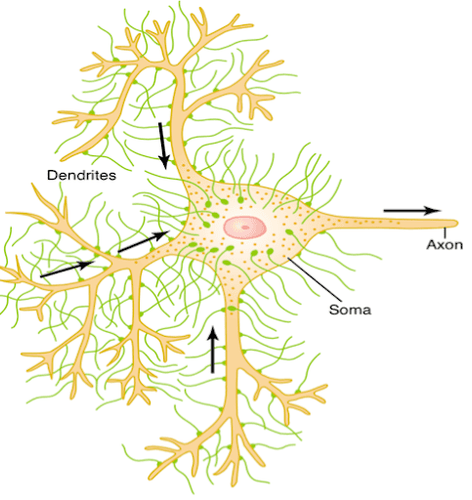
Chất dẫn truyền thần kinh có thể liên kết và những thay đổi trong tế bào được kích hoạt.
In some cases, neurotransmitters can bind to receptors and cause a signal to be transmitted down the cell (excitatory). In some cases, the neurotransmitter can actually block the signal from continuing, preventing the message from being transmitted (inhibition).
So after its job is done, what happens to a neurotransmitter? Once the neurotransmitter has done its job, its activity can be stopped by three mechanisms:
Degradation: In order for the receptor to fail to recognize it, an enzyme that changes its structure occurs. of the neurotransmitter Diffusion : Neurotransmitter exits the receptor Reuptake : The axon of the neuron that has released it regains the entire neurotransmitter molecule.
2. Criteria for determining neurotransmitters
It is very difficult to determine the actual neurotransmitters. While scientists can observe the vesicles contain neurotransmitters, figuring out what chemicals are stored in the vesicles isn't quite as straightforward.
Therefore, neuroscientists have developed several guidelines for determining whether a chemical should be defined as a neurotransmitter:
Presence of the chemical in the cell: Chemistry substance that is synthesized in a nerve cell or found in it. Stimulus-dependent release: neurotransmitters are released in appropriate amounts by neurons when stimulated. Postsynaptic Cell Action: Chemicals must be released by presynaptic neurons and postsynaptic neurons must contain receptors to which the chemicals should bind. Elimination Mechanism: To remove a chemical from its active site after its job is completed, a specific mechanism exists.
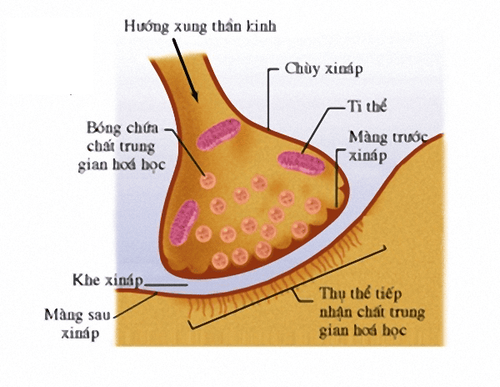
Tế bào thần kinh sau synap phải chứa các thụ thể mà các hóa chất sẽ tạo liên kết.
3. Classification of neurotransmitters
Neurotransmitters play an important role in our daily life and functioning. Scientists still don't know exactly how many neurotransmitters exist, but more than 60 different neurotransmitters have been identified so far.
Neurotransmitters can be classified according to their function:
Excitatory neurotransmitters : These neurotransmitters have an excitatory effect on neurons. Epinephrine and norepinephrine are two of the main excitatory neurotransmitters. Inhibitory neurotransmitters: These types of neurotransmitters have an inhibitory effect on neurons; They reduce the excitability of nerve cells throughout the nervous system. Some of the major inhibitory neurotransmitters include serotonin and gamma-aminobutyric acid (GABA).
Regulatory Neurotransmitters: These neurotransmitters, commonly known as neuromodulators, have the ability to affect a larger number of neurons at once. Due to the action of other neurotransmitters, these neuromodulators are also affected. When synaptic neurotransmitters are released by axon terminals to have a rapid effect on other receptor neurons, the neuromodulators diffuse over a large area. and work slower. In addition, there are several different ways to classify neurotransmitters. In some cases, they are simply broken down into monoamines, amino acids, and peptides.
Neurotransmitters can also be classified into the following 6 categories:
Amino acids
Gamma-aminobutyric acid (GABA) : acts as the body's main inhibitory chemical messenger. GABA contributes to vision, motor control, and plays a role in anxiety regulation. Benzodiazepines can increase feelings of relaxation and calm, used to help treat anxiety, and work by increasing the effectiveness of the neurotransmitter GABA. Glutamate: Considered the most abundant neurotransmitter found in the nervous system, glutamate plays a role in cognitive functions such as memory, concentration or learning. Excessive amounts of glutamate can cause overstimulation. The excitatory toxin caused by this glutamate accumulation has been implicated in a number of diseases and brain injuries including Alzheimer's disease , stroke, and epilepsy. Peptide
Oxytocin: It is produced by the hypothalamus and plays a role in the association between relationships. To support labor and delivery, synthetic Oxytocin such as Pitocin can be used. Endorphins: These neurotransmitters inhibit the transmission of pain signals and promote feelings of euphoria. These hormones are naturally produced by the body in response to pain, but they can also be triggered by other activities such as aerobic exercise.
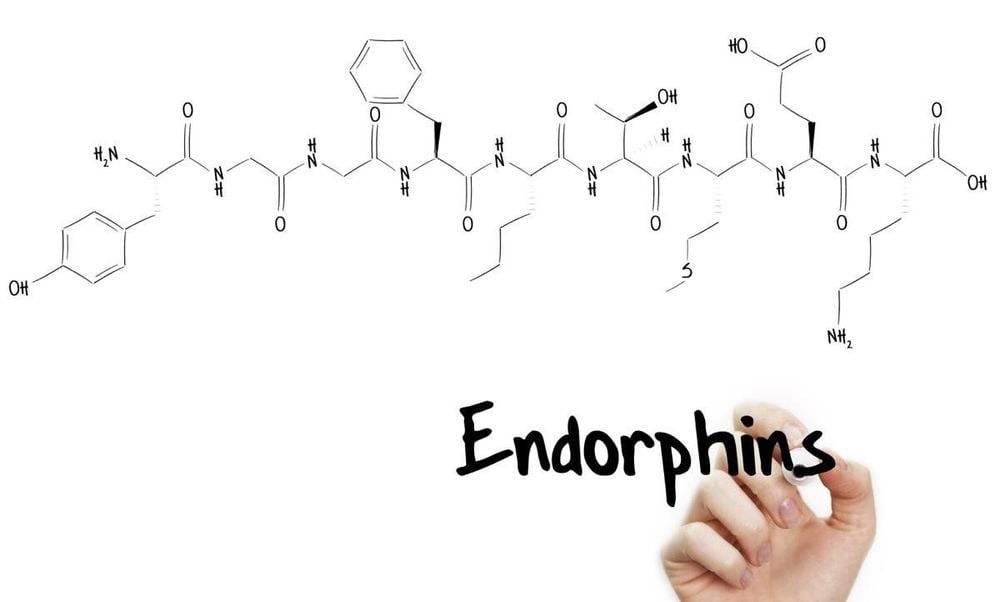
Endorphins ức chế việc truyền tín hiệu đau và thúc đẩy cảm giác hưng phấn.
Monoamines
Epinephrine: Also known as adrenaline, epinephrine is considered a hormone as well as a neurotransmitter. In general, epinephrine is a stress hormone released by the adrenal system. However, it acts as a neurotransmitter in the brain. Norepinephrine: this is a neurotransmitter that plays an important role in alertness, participating in the body's fight or response processes. Its role is to help mobilize the body and brain to act in times of danger or stress. During sleep, levels of this neurotransmitter are often lowest and highest during times of stress. Histamine: this is an organic compound that acts as a neurotransmitter in the brain and spinal cord. It plays a role in allergic reactions and is produced as part of the immune system's response to pathogens. Dopamine: Often referred to as the happy neurotransmitter, dopamine is associated with feelings of euphoria, motivation, and joy. This chemical messenger also plays an important role in coordinating body movements. Parkinson's disease, which is a degenerative disease that leads to tremors and impaired mobility, is caused by a restriction of dopamine-producing neurons in the brain. Serotonin: serotonin plays an important role in regulating mood, sleep, anxiety, sex drive, and appetite. Serotonin reuptake inhibitors (SSRIs) are a type of antidepressant commonly prescribed to treat depression, anxiety, panic disorder, and panic attacks. By blocking serotonin reuptake in the brain, SSRIs work to balance serotonin levels, which can help improve mood and reduce feelings of anxiety. Purines
Adenosine: This natural chemical acts as a neuromodulator in the brain and is involved in suppressing arousal and improving sleep. Adenosine triphosphate (ATP): in the central and peripheral nervous system, ATP acts as a neurotransmitter. It plays a role in autonomic control, sensory conduction, and communication with glial cells. Research shows it can also cause a number of neurological problems including pain, injury, and neurodegenerative disorders. Nitric oxide gas transmission: This compound has a role in affecting smooth muscles, making them relax, facilitating blood vessels to dilate and increasing blood flow to certain organs in the body. Carbon monoxide: This is a colorless, odorless gas that can be toxic. It is even potentially fatal when exposed to high levels by humans. However, Carbon monoxide is also produced naturally by the body, which helps regulate the body's inflammatory response by acting as a neurotransmitter.
Acetylcholine
Acetylcholine : found in both the central and peripheral nervous systems. Acetylcholine is the main neurotransmitter involved in motor neurons. Acetylcholine plays a role in muscle movements as well as memory and learning.
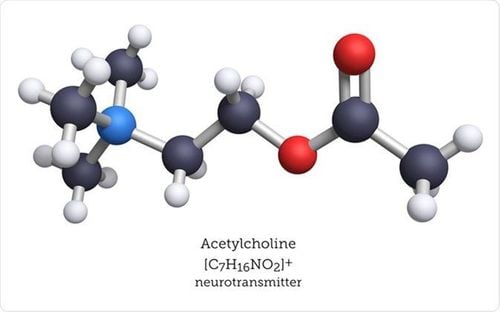
Acetylcholine là chất dẫn truyền thần kinh chính liên quan đến các tế bào thần kinh vận động.
4. How the body will be affected when neurotransmitters do not work properly
Like many other processes in the body, when neurotransmitters don't work properly, things can go wrong. Therefore, it is not surprising that a system as vast and complex as the human nervous system is prone to problems.
Nervous system problems can occur when:
A particular neurotransmitter is not produced enough by nerve cells Neurotransmitters are reabsorbed too quickly Enzymes are disabled too much neurotransmitter Too much specific neurotransmitter is released The body can be affected by a number of different side effects when neurotransmitters are affected by disease or medicine. Diseases such as Alzheimer's, epilepsy, and Parkinson's are linked to certain neurotransmitter deficiencies. Or some drugs can increase neurotransmitters excessively.
Health professionals recognize the role neurotransmitters play in mental health conditions, which is why drugs that affect their action are often prescribed to help treat them. variety of mental illnesses.
For example, dopamine is linked to things like addiction and schizophrenia. Serotonin plays a role in mood disorders including depression and OCD. To help treat symptoms of depression or anxiety, medications, such as SSRIs, may be prescribed by your doctor.
Any questions that need to be answered by a specialist doctor as well as customers wishing to be examined and treated at Vinmec International General Hospital, please contact the Website for the best service.
Please dial HOTLINE for more information or register for an appointment HERE. Download MyVinmec app to make appointments faster and to manage your bookings easily.
References: verywellmind.com, askthescientists.com



